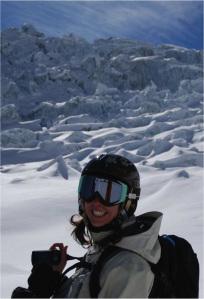
Cynthia Thomson testing her theories on Mont Blanc

Listen now
Why do some athletes reach for the extreme while others enjoy safer, less thrilling pursuits? Is it nature, nurture or a combination of both? Ask most world-class extreme athletes and they’ll tell you some version of the same story. They’d always loved getting close to the edge, pushing themselves to their limits even as young children, driving their parents sick with worry. Once introduced to their chosen sport, they followed it passionately, stopping at nothing to pursue their dreams.
Do they possess an “adventure gene” driving them forward or is there something else going on? University of British Columbia PhD Cynthia Thomson set out to discover just what made these athletes tick. Her recent study of 500 skiers found surprising results. Turns out action sports athletes, like skiers, take up dopamine—one of the brain chemicals associated with reward—in a very different way. Dopamine, along with it’s sister reward drugs seratonin and norepinephrine, keep us humans on the path to seek rewards by doling out the good feelings associated with these chemicals. Ski a double black diamond run, get a hit of dopamine. Give a speech in front of a large crowd, get some seratonin. The brain wants us to push ourselves to be our best. Incidentally, this is the very same high drug users are seeking, but in an ironic twist, the more one uses drugs, the less thrill the body receives each time. Natural highs, on the other hand, act differently.
Thomson found that natural highs, however, are not the same for everyone. Those that seek more thrills, might actually be getting a smaller high every time, thereby skiing the extremes in order to get the same reward others would get on the bunny slopes. Thomson found that the dopamine receptor DRD4 has a variant in the -521 C/T polymorphism. Those with this variant tend to be sensation seekers. Some are even calling this gene variant the “adventure gene.” Thomson claims, however, that thrill seeking is a polygenic activity, or one that brings several genes into play. Furthermore, one’s upbringing can have a major impact on their choice of sport. I was raised in a skiing family (thank God); but had my parent’s been bowlers, I may have followed their path.


